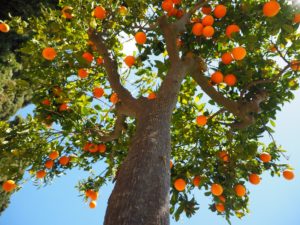low-hang·ing fruit
noun
informal
a thing or person that can be won, obtained, or persuaded with little effort.
Success can be just as sweet as a freshly picked ripe piece of fruit.
It’s easy and tempting to consistently go after the low-hanging fruit; by definition, it can be easily obtained with little effort; it’s easy.
What about the high-hanging fruit?

—
Once upon a time, there were two friendly island tribes who lived on opposite sides of the same island. Each tribe was led by an equally kind and compassionate leader who was dedicated to keeping their tribe’s independence, autonomy, and way of life.
The main source of food for the islanders was a delicious, sweet, and juicy citrus-like fruit that was only found on this island. The island was covered with seemingly endless forests of these 100-foot fruit trees.
One of the leaders valued a fast pace and efficiency. He only focused on the low-hanging fruit that was easily accessible and took little effort. He knew that there was higher hanging fruit up there, but the few times he tried, he either fell from the branches or encountered pesky birds that guarded the fruit hanging high above.
In the back of his mind, he knew that he should learn to get the higher fruit, but always put it off. He was often too tired, too scared, or didn’t have time to learn how to go higher. It seemed too daunting for today, maybe someday.
The other leader valued continuous growth, learning, and wanted to inspire his tribe to reflect on their relationship with adversity. This other leader also picked the low-hanging fruit. But, he also made time to learn about the high-hanging fruit. He scheduled time to consistently put himself in situations to literally and figuratively stretch himself to reach for the fruit that was harder to grasp.
His tribe didn’t need the high-hanging fruit at the moment, but rather the leader wanted to demonstrate the importance of building grit, mental stamina, resilience and fortitude.
Like the first leader, this leader also fell multiple times as he climbed higher. As a result, he took time to reflect on how the system could be better. He learned how to make a harness and pulley system that propelled him to the treetops faster and safer.
One day, he observed the pesky birds above from his harness. He realized that the birds preferred berries from the ground over the fruits above. So, each time he went up, he brought a basket of berries to distract the birds while he picked the high-hanging fruit with ease.
The day finally came when all the low-hanging fruit on the island had been picked.
Without any other choice, the first leader attempted to lead his tribe to a higher altitude in a reactive state. They just couldn’t do it. Climbing was still too difficult and the birds prevented them by getting higher every time. Without their main source of food, many tribe members either left the island or had to join the other tribe.
The other tribe, however, flourished. The lessons learned about high-hanging fruit while they still had low-hanging fruit allowed them to continuously learn, grow, and become better. They learned how the high-hanging fruit could also be used to grow more low-hanging fruit.
With the addition of the new tribe members, they were able to improve their harnesses to go even higher and discover new kinds of fruit.
—
We need the low-hanging fruit to help us stay motivated and to sustain ourselves. However, making time to continuously reach for the high-hanging fruit builds the skills that we will need for long-term success and growth.
Only focusing on what’s easy to do robs you of the opportunity to build grit and perseverance, key skills needed to thrive in the long-term.
As you strive to take your life, career, and business to the next level, what high-hanging fruit have you been avoiding?
What is possible for you if you learn how to harvest what currently seems out of reach?

Leave a Reply